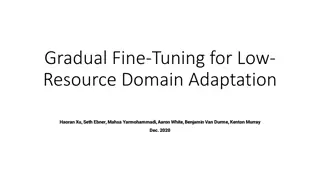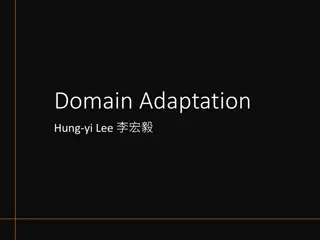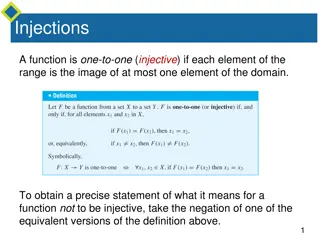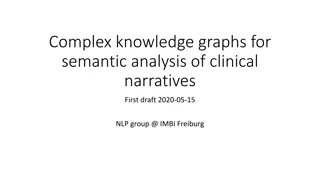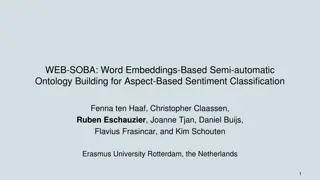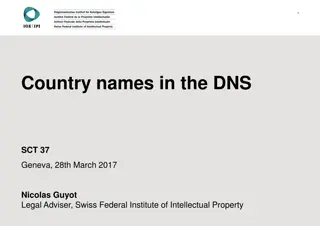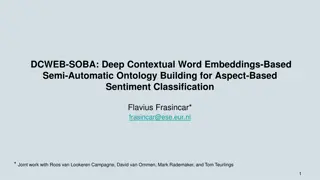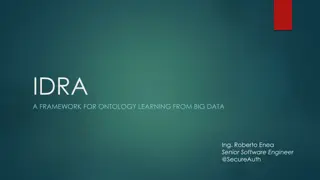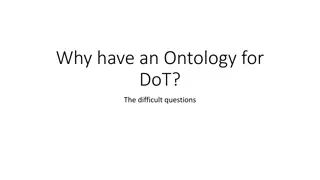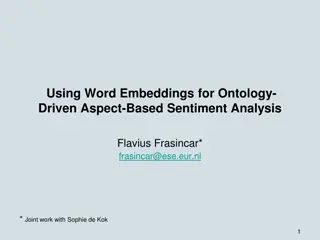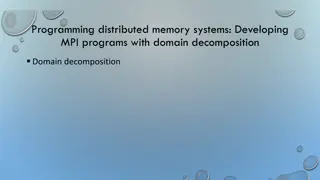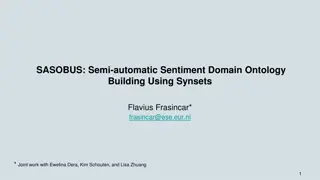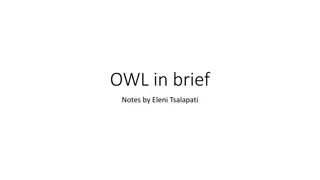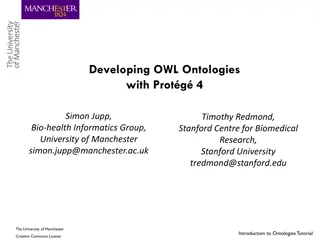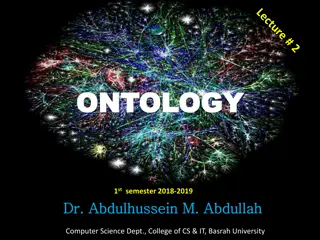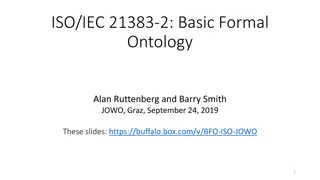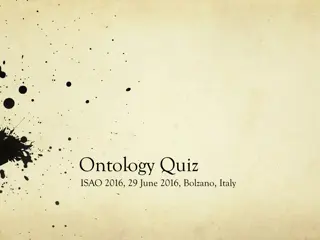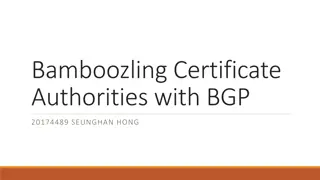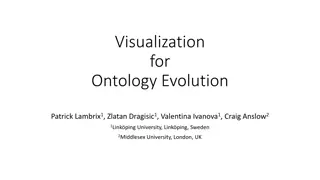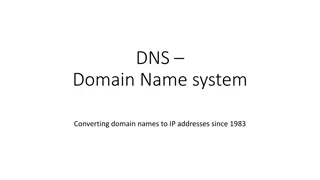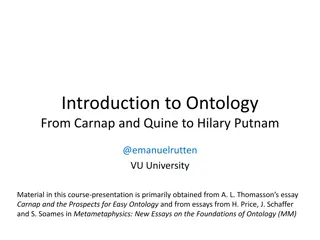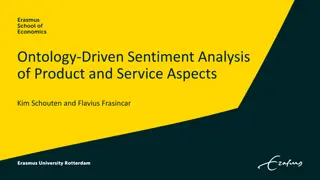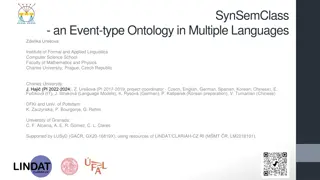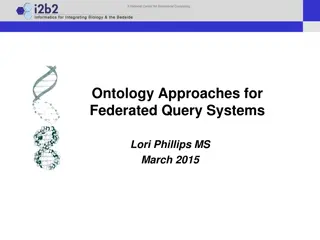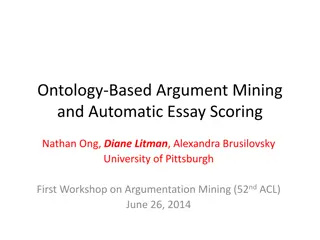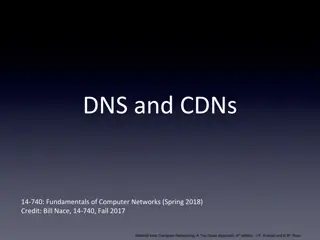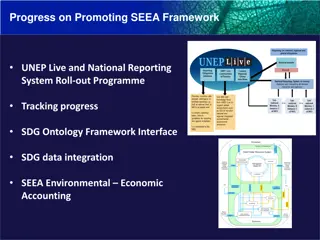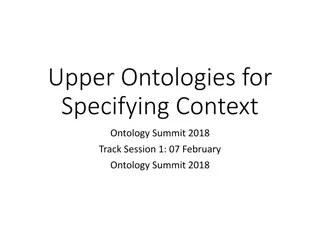Gradual Fine-Tuning for Low-Resource Domain Adaptation: Methods and Experiments
This study presents the effectiveness of gradual fine-tuning in low-resource domain adaptation, highlighting the benefits of gradually easing a model towards the target domain rather than abrupt shifts. Inspired by curriculum learning, the approach involves training the model on a mix of out-of-doma
0 views • 17 slides
Domain Adaptation in Machine Learning
Domain adaptation in machine learning involves transferring knowledge from one domain to another. It addresses the challenge of different data distributions in training and testing sets, leading to improved model performance. Techniques like domain adversarial training and transfer learning play a k
0 views • 16 slides
Injective and Surjective Functions
Injective functions map elements from the domain to the range uniquely, while surjective functions ensure every element in the co-domain has a corresponding element in the domain. The negation of injective means finding x1 and x2 in the domain with the same function value but not equal, whereas for
2 views • 26 slides
Semantic Analysis of Clinical Narratives Using Complex Knowledge Graphs
Need for improved semantic analysis of clinical narratives for information retrieval and decision support is addressed through the use of complex knowledge graphs. These graphs capture axiomatic descriptions of generalizable truths about entities in the medical domain, providing a language-independe
0 views • 8 slides
WEB-SOBA: Ontology Building for Aspect-Based Sentiment Classification
This study introduces WEB-SOBA, a method for semi-automatically building ontologies using word embeddings for aspect-based sentiment analysis. With the growing importance of online reviews, the focus is on sentiment mining to extract insights from consumer feedback. The motivation behind the researc
2 views • 35 slides
Country Names in the Domain Name System (DNS)
The Domain Name System (DNS) plays a crucial role in attributing top-level and second-level domains to country names. This system is global and managed by ICANN, not national offices, allowing for unique attribution to one person. Examples of country names registered as second-level domains are prov
2 views • 7 slides
Semi-Automatic Ontology Building for Aspect-Based Sentiment Classification
Growing importance of online reviews highlights the need for automation in sentiment mining. Aspect-Based Sentiment Analysis (ABSA) focuses on detecting sentiments expressed in product reviews, with a specific emphasis on sentence-level analysis. The proposed approach, Deep Contextual Word Embedding
0 views • 34 slides
Framework for Ontology Learning from Big Data with IDRA
IDRA (Inductive Deductive Reasoning Architecture) presents a comprehensive framework for ontology learning, focusing on data modeling and architecture components. ETL (Extract Transform Load) processes play a vital role in semantic enhancement of data, especially in identity and access governance co
0 views • 25 slides
Importance of Ontology in System Development for DoT
Ontology plays a crucial role in the development of systems for DoT by facilitating the automation of tasks, improving consistency, and enhancing the efficiency of tool chains. It enables the transformation of semantic descriptions into algorithms, streamlining processes and reducing the need for ma
1 views • 7 slides
Hierarchical Attention Transfer Network for Cross-domain Sentiment Classification
A study conducted by Zheng Li, Ying Wei, Yu Zhang, and Qiang Yang from the Hong Kong University of Science and Technology on utilizing a Hierarchical Attention Transfer Network for Cross-domain Sentiment Classification. The research focuses on sentiment classification testing data of books, training
0 views • 28 slides
Using Word Embeddings for Ontology-Driven Aspect-Based Sentiment Analysis
Motivated by the increasing number of online product reviews, this research explores automation in sentiment mining through Aspect-Based Sentiment Analysis (ABSA). The focus is on sentiment detection for aspects at the review level, using a hybrid approach that combines ontology-based reasoning and
1 views • 26 slides
Developing MPI Programs with Domain Decomposition
Domain decomposition is a parallelization method used for developing MPI programs by partitioning the domain into portions and assigning them to different processes. Three common ways of partitioning are block, cyclic, and block-cyclic, each with its own communication requirements. Considerations fo
1 views • 19 slides
BabyDayOut Ontology: Describing Picture with Classes, Instances, and Relations
Ontology "BabyDayOut" is developed using RDF/RDFS to describe a picture. It includes classes such as Person, Animal, Baby, Picture, Man, and Gorilla with instances like John, KingKong, Jack, Peter, and Alex. Various relations like hasFriend, hasAnimalFriend, sonOf, depicts, hasEnemy, and hasTitle ar
1 views • 9 slides
SASOBUS: Semi-Automatic Sentiment Domain Ontology Building Using Synsets
Building on the need for automation due to the increasing volume and significance of online reviews, SASOBUS focuses on Aspect-Based Sentiment Analysis (ABSA). The motivation behind SASOBUS lies in the growth of sentiment mining for product reviews, particularly at the sentence level. Its approach i
1 views • 36 slides
Wyoming Eminent Domain Laws - Legal Updates and Negotiations
Wyoming Legislative Changes to Eminent Domain Laws outline the requirements for exercising eminent domain, including proof of public interest and necessity, diligent negotiations, and proper notification to property owners. The laws also emphasize the importance of good faith negotiations and fair c
0 views • 9 slides
Web Ontology Language (OWL) in a Nutshell
Web Ontology Language (OWL) is a powerful tool for ontology modeling, allowing the creation of complex structures and relationships. OWL encompasses entities, expressions, and properties, enabling detailed descriptions of domains through axioms. The language supports both object and data properties,
1 views • 39 slides
Introduction to Developing OWL Ontologies with Protégé 4
Explore the world of developing OWL ontologies with Protégé 4 through a comprehensive tutorial by Simon Jupp and Timothy Redmond from Stanford Centre for Biomedical Research and the University of Manchester. Learn about OWL introduction, Protégé 4 interface, compositional approach, and the signi
1 views • 44 slides
Introduction to Ontology in Computer Science
Ontology is the study of existence, with applications in various fields like philosophy, linguistics, and computer science. In computer science, an ontology is an engineering artifact that defines a specific vocabulary to describe a domain, along with explicit assumptions about the vocabulary's inte
0 views • 33 slides
ISO/IEC Standards and Ontologies in Information Technology
Exploring the world of ISO/IEC standards and formal ontologies as presented by Alan Ruttenberg and Barry Smith at JOWO Graz in 2019. The slides cover topics such as basic formal ontology, connectors, domain ontologies, top-level ontologies, and the requirements for being a top-level ontology. ISO/IE
0 views • 97 slides
Ontology Quiz: Test Your Knowledge on Computational Logic and Philosophy
Delve into the world of ontology with this quiz featuring questions on computational complexity, mereology, standardization of OWL, and foundational ontologies. Test your understanding on topics such as first-order predicate logic, parthood in mereology, and more. Challenge yourself and expand your
1 views • 45 slides
Securing Domain Control with BGP Attacks and Digital Certificates
Exploring the vulnerabilities of domain control verification in the context of BGP attacks and the role of digital certificates in ensuring security. The process of domain control verification, issuance of digital certificates by Certificate Authorities (CAs), and the significance of Public Key Infr
0 views • 53 slides
Visualizing Ontology Evolution for Improved Knowledge Management
Ontologies are dynamic entities that evolve over time, impacting semantically-enabled applications and knowledge acquisition. This work focuses on identifying desired functionalities for ontology evolution systems, highlighting the steps involved in ontology evolution, and emphasizing the importance
0 views • 16 slides
Evolution of Domain Name System (DNS) Since 1983
Domain Name System (DNS) has played a crucial role in converting domain names to IP addresses since its inception in 1983. This system has revolutionized the way we navigate the internet, translating human-readable names into machine-readable IP addresses. The distributed and hierarchical nature of
0 views • 23 slides
Semantic Tool for Personal Information Protection
Semantic Tool for the Protection of Personal Information Act is a project led by Yahlieel Jafta, aiming to establish a knowledge base using ontology to assist individuals and organizations in interpreting the Act. The project focuses on the importance of ontologies in extending knowledge and enablin
0 views • 17 slides
Comprehensive Guide to Ontology Editors and IDEs for Ontologies
Explore a wide range of Ontology Editors and Integrated Development Environments (IDEs) for managing ontologies efficiently. From simple text editors to advanced IDEs like Protégé and Web Protege, learn about various tools and syntax options available. Dive into Ontology Editors like Protégé 4.3
0 views • 16 slides
Intelligent Ontology Alignment Tool for Complex Mismatches
Dealing with ontology mismatches is crucial in aligning diverse healthcare entities and data sources. Learn about an intelligent ontology alignment tool presented at the ICCS/NTUA workshop in December 2014 in Berlin, focusing on managing conceptual, explication, and classification mismatches using m
0 views • 18 slides
Introduction to Ontology
The evolution of ontology from Carnap's logical positivism to Quine's revival of metaphysics, reshaping the landscape of analytic philosophy. Quine's method for serious ontology challenges traditional views on existence, incorporating scientific theory and logical analysis to explore the nature of r
0 views • 16 slides
Ontology Editor and OWL Syntax Exploration
Delve into the world of ontology editing and OWL syntax with the Protégé Ontology Editor, along with essential reading materials for building OWL ontologies. Discover tools for integrating reasoning and ensuring consistency in your ontologies. Learn about Manchester DL syntax and its user-friendly
0 views • 7 slides
Ontology-Driven Sentiment Analysis for Product and Service Aspects
Sentiment analysis through ontology to determine positive, negative, or neutral sentiments for different aspects of entities. Utilizing ontology for sentiment inference yields explainable results but requires a comprehensive ontology. The purpose is to link lexicalizations to aspect and sentiment co
0 views • 24 slides
SynSemClass - an Event-type Ontology in Multiple Languages
An innovative study on an event-type ontology presented in multiple languages by Zdeka Ureov at Charles University, Prague. This research originates from the Institute of Formal and Applied Linguistics within the Computer Science School. The paper delves into the classification of events with lingui
0 views • 16 slides
Approaches for Federated Query Systems and Ontology Mapping
This content delves into the methodologies, tools, and strategies involved in federated query systems, specifically focusing on ontology mapping, query construction, and types of queries within the i2b2 Star Schema. It discusses the necessity of integrating local codes into central hierarchies and p
0 views • 26 slides
Integrating Ontology Debugging and Matching into Methodology
Most ontology engineering methodologies lack detailed quality assurance steps, leading to issues in ontologies. Ontology Design Patterns can help reduce quality issues in the design stage. eXtreme Design (XD) is a methodology based on ODPs, but additional solutions like ontology matching and debuggi
0 views • 18 slides
Ontology-Based Argument Mining and Automatic Essay Scoring
This research explores the use of ontology-based argument mining and automatic essay scoring to enhance the evaluation process for argumentative essays. By leveraging diagram ontology elements and rule-based algorithms, the system can identify key components like claims, hypotheses, supports, and op
0 views • 17 slides
Introduction to Ontology and IDEs for Ontologies
Ontology is a detailed study of the nature of existence or reality, often represented in structured formats for various applications. Explore different Integrated Development Environments (IDEs) tailored for working with ontologies, from simple text editors to more advanced tools like Protégé and
0 views • 53 slides
Anatomy Track in Ontology Alignment Evaluation Initiative
Explore experiences and insights from the Anatomy track in the Ontology Alignment Evaluation Initiative, focusing on overlapping ontologies, data integration, agent communication, and bottom-up ontology development for improved alignment. Learn about the initiative's goals, evaluation methods, parti
0 views • 37 slides
Understanding Domain Name System (DNS) and Content Delivery Networks (CDNs)
Explore the fundamentals of DNS and CDNs in computer networks, covering topics such as domain organization, address conversion protocols, the importance of domain names, and the process of translating domain names to IP addresses. Discover the challenges and complexities involved in navigating, cach
1 views • 59 slides
Progress on Promoting SEEA Framework and SDG Ontology Integration
Explore the progress made in promoting the System of Environmental-Economic Accounting (SEEA) framework and integrating it with the Sustainable Development Goals (SDG) Ontology. This program tracks advancements in environmental-economic accounting, data flows, ecosystem impacts, and more to enhance
0 views • 4 slides
Ontology Summit 2018: Upper Ontologies for Specifying Context Track Session
Explore the objective of the Ontology Summit 2018 track focusing on upper ontologies for context specification. Delve into the role of upper ontologies in defining context and understanding context partitions, all within the realm of ontology usage. Discover the significance of formalizing meaning w
0 views • 18 slides
Solving Problems in Classic Blocks World Domain
Explore the Classic Blocks World domain starting with BW domain file, solving problems using planning domains, and extending the domain with predicates and constants. Learn about basic add and delete effects in actions, defining predicates and actions, and executing pick-up, put-down, stack, and uns
0 views • 11 slides
Ontology Editors, IDEs, and Syntax: Tools for Effective Ontology Development
Explore ontology editors, Integrated Development Environments (IDEs), and syntax options for efficient ontology creation, such as Protege, Web Protege, Manchester OWL Syntax, and data values and datatypes. Learn about popular tools, features, and best practices for managing ontologies effectively.
0 views • 16 slides
